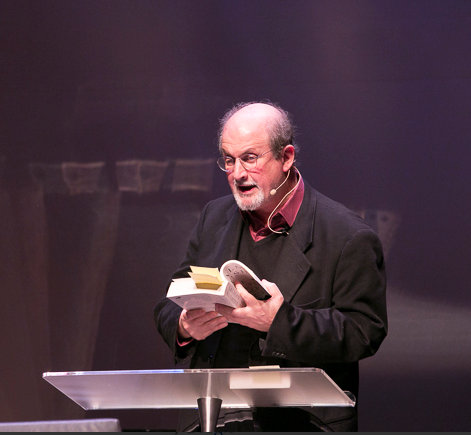Salman Rushdie kicks off BAM’s 10th season of ‘Eat, Drink & Be Literary’
Hundreds Gathered To Wine, Dine and Mingle

The Brooklyn Academy of Music (BAM) kicked off the 10th year of its popular, “Eat, Drink & Be Literary” lecture series on Wednesday night at the BAMcafé with acclaimed and controversial author, Salman Rushdie. The program, which stretches until May 28, is organized in partnership with the National Book Awards and will feature eight accomplished novelists; next appearing, on Feb. 12, is Alice McDermott. Around 250 patrons gathered to enjoy a buffet dinner and wine, after which Rushdie took the stage. “Eat, Drink” is sponsored by Bloomberg and Pine Ridge Vineyards.
After dinner, Rushdie read from his works “The Moor’s Last Sigh” (1995) and “The Ground Beneath her Feet” (1999). “So this is Brooklyn,” he began, drawing applause. The seldom-bashful Rushdie then launched into a love scene from “The Moor’s Last Sigh,” in which the union of the narrator’s parents takes place atop a sack of pepper in a warehouse in India. “It is easy to write badly about sex,” he told the audience. “The antidote is humor — just remember that under the humor there is feeling.”
Currently working on his 9th novel, Rushdie doesn’t stray too far from his familiar themes of the marginalization and estrangement he has experienced both as an exile from his native India and as a non-believer. “It’s nice to read from old works,” he said, his Cambridge-educated speaking voice flowing seamlessly from addressing the audience to reading.

Brooklyn Boro
View MoreNew York City’s most populous borough, Brooklyn, is home to nearly 2.6 million residents. If Brooklyn were an independent city it would be the fourth largest city in the United States. While Brooklyn has become the epitome of ‘cool and hip’ in recent years, for those that were born here, raised families here and improved communities over the years, Brooklyn has never been ‘uncool’.